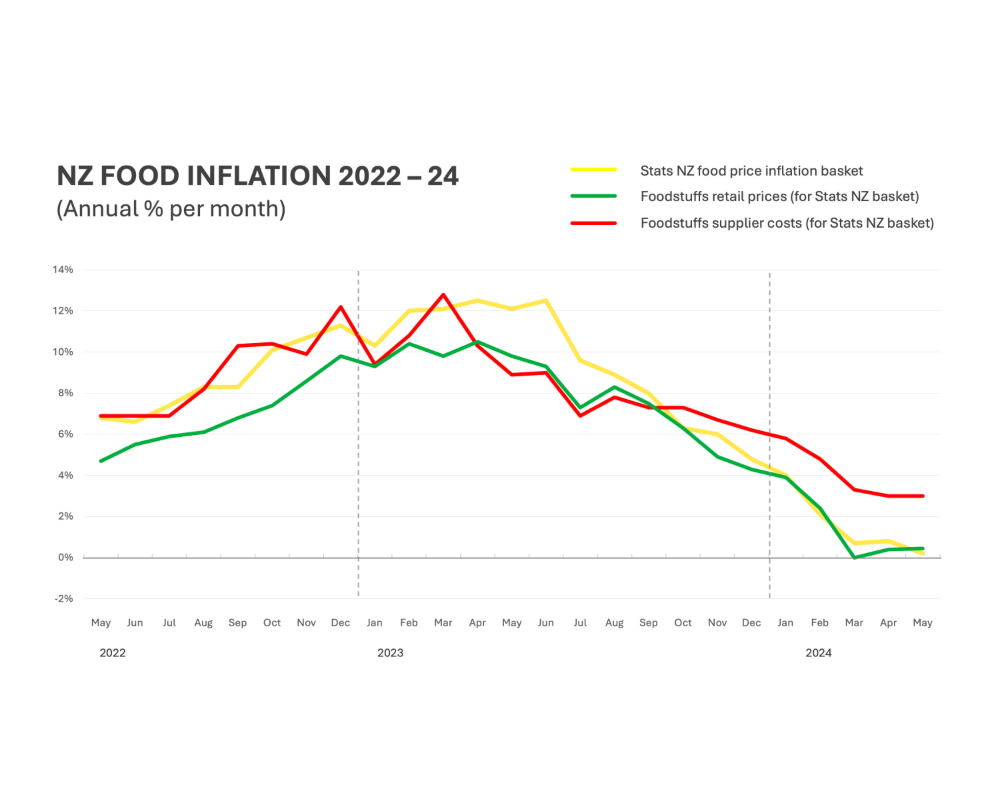Foodstuffs co-ops see third month of sub-1% annual food price inflation
- Stats NZ’s official rate of food price inflation 0.2% nationwide in the 12 months to May 2024
- Foodstuffs co-ops see retail price increases of 0.45% in the same categories as Stats NZ basket
- Foodstuffs’ supplier cost increases again outpace retail price rises, at 3.6% in 12 months to May
The Foodstuffs grocery co-ops have recorded an average rate of food price inflation that’s under 1% per annum for the third month in a row.
The two Foodstuffs co-ops, whose member-families own the country’s 500+ PAK’nSAVE, New World and Four Square stores, have been comparing the average rate of price increases across their stores for foods in the same categories as Stats NZ’s food inflation ‘basket’ since mid-2022.
In the latest month, May 2024, while Stats’ annual rate was 0.2%, the Foodstuffs co-ops recorded 0.45%. It’s the third consecutive month both rates have been below the government’s inflation target of 1 – 3%.
Foodstuffs NZ Managing Director Chris Quin says it’s encouraging to see food price inflation staying under the lower end of that range, after two years of concerted efforts by the co-ops to help get it under control.
“The last time New Zealand had three months of sub-1% annual food price inflation was in late-2018,” says Quin. “It essentially means $100 worth of goods sold a year ago costs less than 50 cents more now.”
“In an ideal world there’d be no inflation but as grocers we know there are always upward cost pressures, and it’s our job to keep mitigating those by buying well and getting good deals so we can keep prices low.”
In fact, in May, the co-ops recorded a 3.6% increase in what suppliers charged for food categories in Stats’ basket – the eighth consecutive month they’ve outpaced retail price rises, as shown in the chart below.

“Our co-ops have been absorbing the difference between retail price increases and supplier cost rises because we’re united in our determination to beat inflation on behalf of our customers,” says Quin.
“The success of that united approach underscores the merit in our proposal to merge our two co-ops into one national co-op, so we can keep fighting for low prices well into the future.”
Fruit and veg ~10% cheaper than a year ago
Helping to keep Foodstuffs’ retail price rate low was an average 9.5% decrease in the price of fruit and veggies in Stats NZ’s basket, with the 10 biggest year-on-year decreases shown in the table below:
|
Item |
Price difference vs. May 2023 |
Item |
Price difference vs. May 2023 |
|
Celery |
↓48% |
Broccoli |
↓30% |
|
Kūmara (orange) |
↓47% |
Cabbage (green) |
↓28% |
|
Avocadoes (NZ) |
↓39% |
Pumpkin (crown) |
↓28% |
|
Potatoes |
↓35% |
Cauliflower |
↓24% |
|
Onions (brown) |
↓33% |
Lettuce |
↓23% |
Foodstuffs’ produce experts say new season avocadoes are now back in-store – a relief to growers after many suffered cyclone damage last year – with prices expected to reduce as supply improves.
However, winter light levels and colder temperatures mean covered crops like tomatoes and capsicums are now out of season, with higher prices reflecting the suppliers’ extra cost of heating their glasshouses.
Global shipping costs under pressure
Meanwhile, the co-ops’ logistics experts say shipping costs remain relatively stable but increases have been flagged. They say greater demand for shipping space out of Asia and less global supply of containers due to the Red Sea crisis are making it harder to secure regular and reliable bookings to New Zealand.
Chris Quin says one of the strengths of the Foodstuffs co-ops is their ability to respond to such logistical challenges, using their in-house experts and bulk-buying power to ensure supplies keep coming through.
“Our co-ops were formed so individual grocers could band together and get better deals for the benefit of their customers,” he says. “There’s strength in numbers and even more so in today’s globalised world. As a nation of five million in a world of eight billion, you need a united voice to be heard.”
“That’s one reason our grocers voted overwhelmingly to approve our co-ops’ proposed merger, last week – because they know that being one nationwide grocery co-op will ultimately make us stronger in the global marketplace and better able to keep delivering value at the checkout.”
